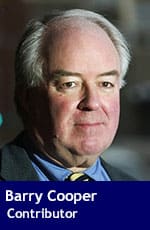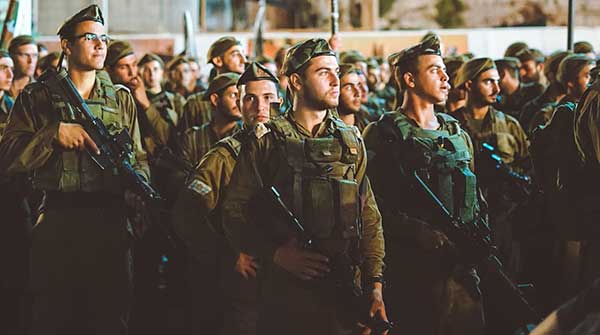Calling Hamas a terrorist organization “is opinion not fact,” according to a CBC internal email
 Military historians often use the term “asymmetric warfare” to describe the recent terrorist attack by Hamas on Israel. They use this language not to avoid considering the moral implications of terrorism or to refuse to distinguish between uniformed soldiers operating within military formations conforming to the laws of war and freelance combatants operating outside regular military service.
Military historians often use the term “asymmetric warfare” to describe the recent terrorist attack by Hamas on Israel. They use this language not to avoid considering the moral implications of terrorism or to refuse to distinguish between uniformed soldiers operating within military formations conforming to the laws of war and freelance combatants operating outside regular military service.
The “asymmetry” refers to significant differences in military capabilities. One side usually has sophisticated weapons – aircraft and tanks, for example – and a large, uniformed establishment. The other does not. Practitioners of this irregular warfare, including Hamas, do not follow the conventional laws of war, one of which distinguishes sharply between soldiers and civilians.
A second, commonsensical approach to such conflicts focuses on the moral implications of terrorist war-making as distinct from peer-on-peer conflict. Third, there is the amoral relativism that begins and ends with the assumption, now a cliché, that one man’s terrorist is another man’s freedom fighter.
To appreciate the significance of the Hamas attack, consider the early accounts of what happened. The conflict began with an extensive rocket bombardment from Gaza into southern and central Israel. This proved to be a diversion since it was quickly followed by a ground attack by trucks and other vehicles that carried several hundred (perhaps more) heavily armed men across the breached border fence to attack nearby and unfortified Israeli villages.
The chief purpose of the attack was simple: kill as many Israelis as possible. Civilians were massacred in their homes or in nursing homes; some as they waited at bus stops. The Israeli Defence Force found a kibbutz where 40 babies were murdered. An equally horrific instance involved the massacre of over 260 young adults attending an overnight music festival – a rave – dedicated to “friends, love and peace.” Many of the survivors hid in bushes as gunfire passed over their heads.
A second aim of the attack was to kidnap as many Israelis as Hamas could find. Children, women, and the elderly were bundled into vehicles and driven back into Gaza as hostages.
Much of this activity has been captured on video and posted online. One piece showed a dead soldier being mutilated by a mob screaming, “God is great.” Another showed a terrified woman, squeezed between two Hamas men, being driven off on a motorcycle while her boyfriend was removed on foot.
This rampage by Hamas has been called the worst massacre of Jews since the Holocaust.
Perhaps more to the point, by targeting non-combatants for execution or kidnapping, there can be no question that Hamas conducted a large-scale act of terrorism. Since Hamas has been identified as a terrorist entity by the Canadian government since 2002, this designation is not surprising.
But this is precisely where matters grow interesting. The Canadian Union of Public Employees, Local 3906 in Hamilton, representing “workers” at McMaster University, threw its support behind Hamas. “Palestine is rising,” they said. “Long live the resistance.”
And then there is CBC. On October 7, just as the Hamas attack was getting well underway, George Achi sent out an email to all CBC journalists telling his subordinates how to discuss Gaza and Hamas. Achi is the Director of Journalistic Standards and Practices and Public Trust, a senior position that comes with considerable responsibility considering the lack of public trust many Canadians have in CBC. He argued that 2005, the date of the Israeli withdrawal from Gaza, was not to be described as “the end of the occupation” because Israel maintained control over legitimate movement in and out of the area. 2005 simply marked the end of the Israeli military presence there.
Second, he advised, “do not refer to militants, soldiers, or anyone else as ‘terrorists’” because “terrorism remains heavily politized and is part of the story.” Calling Hamas a terrorist entity “is opinion not fact.”
In its own web-based coverage, under the anodyne title Hundreds dead as war erupts after surprise Hamas attack catches Israel off guard, CBC followed Achi’s advice. The term “terrorist” was never used to describe the actions of Hamas. The term “militant” appeared 12 times, “fighter” five times, and “gunman” twice.
CBC later confirmed the accuracy of the Achi email and described it as evidence of their “commitment to accuracy, balance, and fairness.”
Really.
HonestReportingCanada, which published the email on its blog, called this directive “not surprising, but appalling nonetheless.” Consequently, they said, “listeners and viewers will continue to be misled.” I agree, but an additional point is required. Vladimir Lenin once referred to capitalists who would do business with communists as “useful idiots”, i.e., that capitalist trade kept brutal communist tyrannies alive than otherwise might be the case.
One last observation: it is clear the concessions made over Gaza in 2005 didn’t work. Consequently, today, the possibility of peace between the Israelis and the Palestinians in Gaza requires the extinction of Hamas.
Barry Cooper is a professor of political science at the University of Calgary and a Senior Fellow at the Aristotle Foundation for Public Policy. His book on terrorism was recovered by Seal Team Six during their visit to the Osama bin Laden compound in Abbottabad in May 2011.
For interview requests, click here.
The opinions expressed by our columnists and contributors are theirs alone and do not inherently or expressly reflect the views of our publication.
© Troy Media
Troy Media is an editorial content provider to media outlets and its own hosted community news outlets across Canada.

